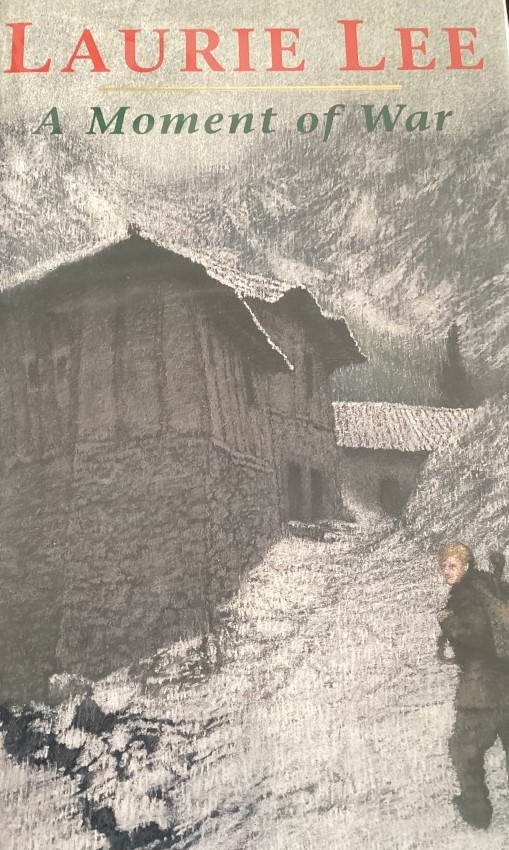Inspiring Older Readers
 posted on 04 May 2025
posted on 04 May 2025
A Moment of War by Laurie Lee
A Moment of War is the third part of Lee’s autobiographical trilogy and one that for some obscure reason I never got around to reading before now. It’s an admission that sounds – even to me – still more unfathomable because I so love the other two instalments, Cider with Rosie* and As I Walked Out One Midsummer Morning.
For those of you who find themselves in the same position as me and coming to this book for the first time, I have to warn you that the slightly whimsical, bucolic feel of the first two parts does not follow through into A Moment of War. This is, in every way, a more sobering and frequently bleak portrait of war on the frontline: a war that’s more about confusion, dirt, discomfort, misinformation and jeopardy.
Lee doesn’t tell us anything about his politics or what drove him to walk – yes walk – across the mountains from France into Spain, carrying nothing but his backpack and violin, to present himself as a volunteer for the Republican cause in the Spanish Civil War. And, even more insanely, in the depths of winter with the country in deep-freeze and covered in snow.
This seeming lunacy is such an extraordinary gesture that it immediately flags him up as suspect to the Republicans – is he really just a Franco spy masquerading as this incredibly naïve Englishman? Well, combined with some incriminating travel stamps on his passport, these suspicions are more than enough to get him very nearly executed on more than one occasion.
But when the dust settles, Lee spends the best part of a year moving from Figueres to Valencia on to Tarazona, Madrid and Teruel, ending up in Barcelona. You’re not going to find lots of action here, no heart-stopping descriptions of big battles – this isn’t Hemingway. In fact, you may, like me, be left feeling this rather wide-eyed, ingenuous young man is more Pooter than shooter. Nor is this Orwell in Homage to Catalonia – this is not a nest of political vipers.
But, in truth, I suspect the very mundane ordinariness of Lee’s time – misunderstandings, vermin, women (when available) and the constant rumours of danger and incipient victory – is closer to the genuinely unglamourous nature of civil war.
Lee’s style enhances this notion of ordinariness: it’s understated, even flat at times, and seems to be wilfully avoiding exciting the author or the reader. Even as he’s being lined up to be executed as a spy, Lee seems to step outside himself and describe the event as if he were a disinterested, distant observer of events rather than the victim of a grotesque misunderstanding.
This book isn’t in any way didactic – it’s a slice of time that needs, the author seems to suggest, no explanation and no apologies. But is it really? Questions have been raised about whether Lee has played a bit fast and loose with the truth of his time in the Republican army and Lee himself has said in the past that because he lost the diaries in which he recorded his experiences, this book written many years after the events it describes, is the work of memory – the experiences of an eyewitness. Similar critiques have been made of Lee’s earlier volumes with their sun-tinged memories of childhood and buccaneering youth and it’s almost certainly the case that he gilded the lily and the truth of the matter is that his work lies somewhere between autobiography and fiction. But I would suggest that none of this invalidates the power of the experiences he conjures and which we so willingly participate in and now I’ve completed the trilogy, I’d be more than happy to start all over again.
You’ll find both paperback and hardback copies easy enough to find for well under £10.
Terry Potter
May 2025
* A further review of Cider With Rosie can be found here